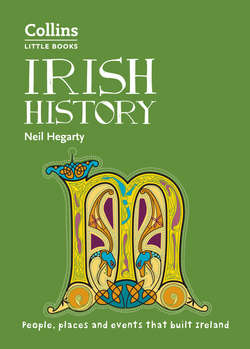Читать книгу Irish History: People, places and events that built Ireland - Neil Hegarty - Страница 5
Introduction
ОглавлениеFrom the very beginnings of its history, the island of Ireland has been open to the influence of the surrounding world. The seas that separate Ireland from its European neighbours might seem, on the face of it, to act as barriers, dividing the inhabitants of Ireland from international affairs. In fact, the opposite has always been the case, for the seas have acted as highways, bringing foreign influences, goods and traffic, travellers, wanderers, and invaders to Irish shores.
This, then, is an island with a history woven into a much larger tapestry – and the pages of this book demonstrate this international dimension in Irish history time and again. The first inhabitants of Ireland arrived from abroad, as the ice sheets retreated and the seas rose, and they have continued to arrive from overseas. The work of acculturation – of newcomers putting down roots in a new land, trading, farming, connecting in human, cultural, social, and economic ways – can be seen consistently at play, and this process complicates the narratives of invasion and conquest that form such dominant themes in Irish history.
Of course, armed invasions have indeed recurred throughout Irish history and they were ferocious in nature. In their wake came death, starvation, and dispossession, with the poor, the old, women, and children bearing the brunt of the violence, and no history worth the name can sidestep such brutal facts. This book traces the nature and character of such episodes, some of which are better known than others. The incursion of Scottish armies into Ireland brought ruin to the land, but this fourteenth-century episode is less well remembered than the Cromwellian invasion of the seventeenth century, which devastated Irish society, causing the deaths of hundreds of thousands of Irish men, women, and children. The figure of Oliver Cromwell himself is remembered in England as a proto-democrat, but in Ireland his name is associated with gruesome violence and genocide. Such episodes are worth dwelling on, for they remind us that if a history is to be truly meaningful, it must illuminate the experience of the defeated, as well as that of the victor.
Stubborn political dogma and wilful blindness have also played malignant roles in the story of Ireland, and this is nowhere better exemplified than in the events of the Great Famine of the nineteenth century. This is Ireland’s defining social, economic, emotional, and demographic fracture. It offers a dreadful reminder that violence and trauma in history take many forms, and leave a mark upon society for generations to come.
This book attends to the complexity of Ireland past and present: to its writers and its architecture, its landscape and natural world, its religions, artefacts, and sports, and to the imprint and lasting influence of the ancient Irish language. It traces the stories of its politics and its divisions. One such division – the political border that runs through the island today – has seldom been out of the headlines in recent years. The violence it has engendered and the political tensions that surround it are examined too in all their fraught complexity, together with the facts surrounding the creation of two Irish states in the modern era, and the trajectories of their society and politics. The nature of the peace process in Northern Ireland, the progressive politics that have emerged in a Republic of Ireland that was once a bastion of Catholicism in Europe: these issues and more are explored – all with an eye on a future that, in an age of Brexit, is remarkably, startlingly plastic.
Ireland is, in demographic terms, a young country, with an eye on the future: it has embraced modernity and is open to European and global influences. And yet, it remains a singular place, and mindful of the past. This Little Book illuminates many elements in this past and, in the process, it offers a reminder that, in understanding our history, we can also better understand our present world.
